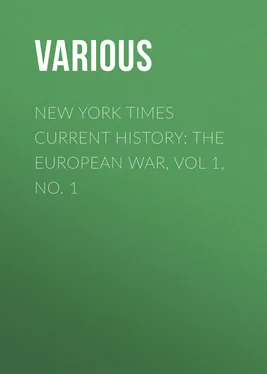Various - New York Times Current History - The European War, Vol 1, No. 1
Здесь есть возможность читать онлайн «Various - New York Times Current History - The European War, Vol 1, No. 1» — ознакомительный отрывок электронной книги совершенно бесплатно, а после прочтения отрывка купить полную версию. В некоторых случаях можно слушать аудио, скачать через торрент в формате fb2 и присутствует краткое содержание. Жанр: foreign_edu, periodic, История, на английском языке. Описание произведения, (предисловие) а так же отзывы посетителей доступны на портале библиотеки ЛибКат.
- Название:New York Times Current History: The European War, Vol 1, No. 1
- Автор:
- Жанр:
- Год:неизвестен
- ISBN:нет данных
- Рейтинг книги:4 / 5. Голосов: 1
-
Избранное:Добавить в избранное
- Отзывы:
-
Ваша оценка:
- 80
- 1
- 2
- 3
- 4
- 5
New York Times Current History: The European War, Vol 1, No. 1: краткое содержание, описание и аннотация
Предлагаем к чтению аннотацию, описание, краткое содержание или предисловие (зависит от того, что написал сам автор книги «New York Times Current History: The European War, Vol 1, No. 1»). Если вы не нашли необходимую информацию о книге — напишите в комментариях, мы постараемся отыскать её.
New York Times Current History: The European War, Vol 1, No. 1 — читать онлайн ознакомительный отрывок
Ниже представлен текст книги, разбитый по страницам. Система сохранения места последней прочитанной страницы, позволяет с удобством читать онлайн бесплатно книгу «New York Times Current History: The European War, Vol 1, No. 1», без необходимости каждый раз заново искать на чём Вы остановились. Поставьте закладку, и сможете в любой момент перейти на страницу, на которой закончили чтение.
Интервал:
Закладка:
The War Office Bait of Starvation.
But this blunder was a joke compared to the next exploit of the War Office. It suddenly began to placard the country with frantic assurances to its five-thousand-a-year friends that they would be "discharged with all possible speed THE MINUTE THE WAR IS OVER." Only considerations of space restrained them, I presume, from adding "LAWN TENNIS, SHOOTING, AND ALL THE DELIGHTS OF FASHIONABLE LIFE CAN BE RESUMED IMMEDIATELY ON THE FIRING OF THE LAST SHOT." Now what does this mean to the wage worker? Simply that the moment he is no longer wanted in the trenches he will be flung back into the labour market to sink or swim without an hour's respite. If we had had a Labour representative or two to help in drawing up these silly placards—I am almost tempted to say if we had had any human being of any class with half the brains of a rabbit there—the placards would have contained a solemn promise that no single man should be discharged at the conclusion of the war, save at his own request, until a job had been found for him in civil life. I ask the heavens, with a shudder, do these class-blinded people in authority really intend to take a million men out of their employment; turn them into soldiers; and then at one blow hurl them back, utterly unprovided for, into the streets?
But a War Office capable of placarding Lord Roberts's declaration that the men who are enlisting are doing "what all able-bodied men in the kingdom should do" is clearly ignorant enough for anything. I do not blame Lord Roberts for his oratorical flourish: we have all said things just as absurd on the platform in moments of enthusiasm. But the officials who reproduced it in cold blood would have us believe that soldiers live on air; that ammunition drops from heaven like manna; and that an army could hold the field for twenty-four hours without the support of a still more numerous body of civilians working hard to support it. Sane men gasp at such placards and ask angrily, "What sort of fools do you take us for?" I have in my hand a copy of The Torquay Times containing a hospitable invitation to soldiers' wives to call at the War Office, Whitehall, S.W., if they desire "assistance and explanation of their case." The return fare from Torquay to London is thirty shillings and sixpence third class; but the War Office no doubt assumes that all soldiers' wives keep motor cars. Still, let us be just even to the War Office. It did not ask the soldiers' wives for forms of authorization to pay the separation allowance to their bankers every six months. It actually offered the money monthly!
Delusive Promises.
The middle and upper classes are nearly as bad as the War Office. They talk of keeping every man's place open for him until the end of the war. Obviously this is flatly impossible. Some places can be kept, and no doubt are being kept. Some functions are suspended by the war and cannot be resumed until the troops return to civil life and resume them. Employers are so hardened to the daily commercial necessity for discharging men without a thought as to what is to become of them that they are quite ready to undertake to sack the replacers when the troops come back. Also the return of peace may be followed by a revival of trade in which employment may not be hard to find, even by discharged soldiers, who are always passed over in the labour market in favour of civilians, as those well know who have the task of trying to find places for them. But these considerations do not justify an attempt to persuade recruits that they can go off soldiering for months—they are told by Lord Kitchener that it will probably be for years—and then come back and walk to their benches or into their offices and pick up their work as if they had left only the night before. The very people who are promising this are raising the cry "business as usual" in the same breath. How can business be carried on as usual, or carried on at all, on unoccupied office stools and at counters with no men behind them? Such rubbish is an insult to the recruit's intelligence. These promises of keeping places open were made to the men who enlisted for South Africa, and were of course broken, as a promise to supply green cheese by quarrying the moon would have been broken. New employees must be found to do the work of the men who are in the field; and these new ones will not all be thrown into the street when the war is over to make room for discharged soldiers, even if a good many of these soldiers are not disqualified by their new training and habits for their old employment. I repeat, there is only one assurance that can be given to the recruits without grossly and transparently deluding them; and that is that they shall not be discharged, except at their own request, until civil employment is available for them.
Funking Controversy.
This is not the only instance of the way in which, under the first scare of the war, we shut our eyes and opened our mouths to every folly. For example, there was a cry for the suspension of all controversy in the face of the national danger. Now the only way to suspend controversial questions during a period of intense activity in the very departments in which the controversy has arisen is to allow them all to be begged. Perhaps I should not object if they were all begged in favour of my own side, as, for instance, the question of Socialism was begged in favour of Socialism when the Government took control of the railways; bought up all the raw sugar; regulated prices; guaranteed the banks; suspended the operation of private contracts; and did all the things it had been declaring utterly and eternally Utopian and imposible when Socialists advocated them. But it is now proposed to suspend all popular liberties and constitutional safeguards; to muzzle the Press, and actually to have no contests at bye-elections! This is more than a little too much. We have submitted to have our letters, our telegrams, our newspapers censored, our dividends delayed, our trains cut off, our horses and even our houses commandeered, our streets darkened, our restaurants closed, and ourselves shot dead on the public highways if we were slow to realize that some excited person bawling in the distance was a sentry challenging us. But that we are to be politically gagged and enslaved as well; that the able-bodied soldier in the trenches, who depends on the able-minded civilian at home to guard the liberties of his country and protect him from carelesness or abuse of power by the authorities whom he must blindly and dumbly obey, is to be betrayed the moment his back is turned to his fellow-citizens and his face to the foe, is not patriotism: it is the paralysis of mortal funk: it is the worst kind of cowardice in the face of the enemy. Let us hear no more of it, but contest our elections like men, and regain the ancient political prestige of England at home as our expeditionary force has regained it abroad.
The Labour Party, then, need have no hesitation in raising all the standing controversies between Democracy and Junkerism in their acutest form, and taking advantage of the war emergency to press them to a series of parliamentary victories for Labour, whether in negotiations with the Government whips, in divisions on the floor of the House, or in strenuously contested bye-elections. No doubt our Junkers will try to disarm their opponents by representing that it would be in the last degree unfair, un-English, and ungentlemanly on the part of the Labour members to seize any tactical advantage in parliamentary warfare, and most treacherous and unpatriotic to attack their country (meaning the Junker Party) when it is at war. Some Labour members will be easily enough gulled in this way: it would be laughable, if the consequences were not so tragic, to see how our parliamentary beginners from the working class succumb to the charm of the Junker appeal. The Junkers themselves are not to be coaxed in this manner: it is no use offering tracts to a missionary, as the poor Kaiser found when he tried it on. The Labour Party will soon learn the value of these polite demonstrations that it is always its duty not to hamper the governing classes in their very difficult and delicate and dangerous task of safeguarding the interests of this great empire: in short, to let itself be gammoned by elegant phrases and by adroit practisings on its personal good-nature, its inveterate proletarian sentimentality, and its secret misgivings as to the correctness of its manners. The Junkers have already taken the fullest advantage of the war to paralyze democracy. If the Labour members do not take a vigorous counter-offensive, and fight every parliamentary trench to the last division, the Labour Movement will be rushed back as precipitately as General von Kluck rushed the Allies back from Namur to the gates of Paris. In truth, the importance of the war to the immense majority of Englishmen, Frenchmen, and Germans lies in the possibility that when Junkers fall out common men may come by their own.
Читать дальшеИнтервал:
Закладка:
Похожие книги на «New York Times Current History: The European War, Vol 1, No. 1»
Представляем Вашему вниманию похожие книги на «New York Times Current History: The European War, Vol 1, No. 1» списком для выбора. Мы отобрали схожую по названию и смыслу литературу в надежде предоставить читателям больше вариантов отыскать новые, интересные, ещё непрочитанные произведения.
Обсуждение, отзывы о книге «New York Times Current History: The European War, Vol 1, No. 1» и просто собственные мнения читателей. Оставьте ваши комментарии, напишите, что Вы думаете о произведении, его смысле или главных героях. Укажите что конкретно понравилось, а что нет, и почему Вы так считаете.











